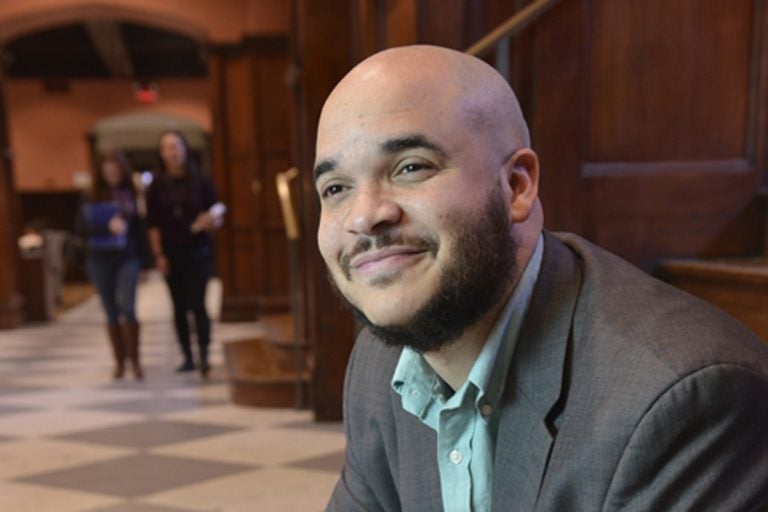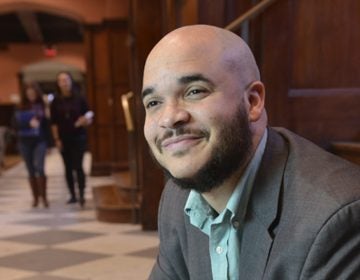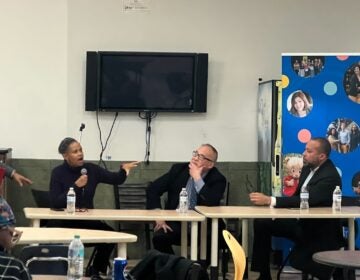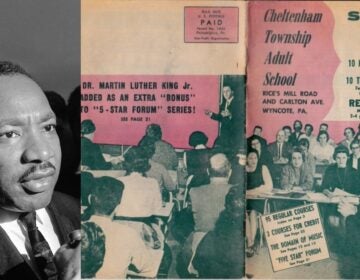Daring to put legs on faith with the inspiration of MLK
Rising to the challenges of the Rev. Dr. Martin Luther King Jr.'s legacy encompasses more than a day of service.
Listen 6:22
University of Pennsylvania Chaplain Charles "Chaz" Howard will be one of the panelists Monday discussing “Does Dr. King’s Life, Legacy, and Hope for America Matter?” (University of Pennsylvania photo)
On Monday, a day of service will honor Dr. Martin Luther King Jr.’s birthday. In the spring, activities will mark the 50th anniversary of his assassination. Between now and then, a Philadelphia group will host conversations about King’s legacy.
NewCORE, WHYY, and Philadelphia Media Network are presenting a public discussion, “Does Dr. King’s Life, Legacy, and Hope for America Matter?” Monday evening at 6 p.m. at the Philadelphia Media Network Building, 801 Market St.
University of Pennsylvania chaplain and author Charles “Chaz” Howard is one of the panelists.
Morning Edition host Jennifer Lynn recently posed that question to University of Pennsylvania chaplain and author Charles “Chaz” Howard, one of the panelists.
Does Dr. King’s life, legacy, and hope for America matter?
America is comprised of individuals. You know, we’re more than just a government. We’re more than just an idea. We are millions of people who have to ask themselves that question. And that’s not an easy question to answer when you think about the questions that King asked each of us around the giant triplets that are are hurting and stepping on us: militarism, materialism, and racism. As individuals we must ask ourselves that question: What am I going to do about those three challenges to us?
It’s mind-boggling to think that Dr. King’s dream has been forgotten by anyone for even a second. When in your life did his way of doing things or his words first catch your attention?
My father was friends with Dr. King. They were in the same fraternity, Alpha Phi Alpha. And I think that’s how I first connected with him; he said “Brother Martin.” And so I think I was exposed to my dad’s friend when I was younger, certainly not meeting Dr. King, but hearing my dad’s stories.
I think I met him again, though, when I was in college and got to really journey with his words, his sermons, his writings, the interviews with him politically. When I was in seminary, I really wrestled with King’s challenges. I still wrestle with them. Like all great historical mentors that we have, I feel like he’s still in my ear. He’s still pushing me every single year.
And what’s in your ear? What do you hear?
That question: “What are you going to do about it?” That’s the great gift I’ve received from Dr. King. Dare to put legs on your faith. And it’s easy for us to — in the midst of football playoffs I’ll use the metaphor “Monday morning quarterback” — that’s what’s happening in our country. It’s more difficult to put some legs on your complaint than go out there and do something about it, to say something about it, and that’s what I hear Dr. King saying: Why don’t you stop complaining about what you think is wrong and work on it?
Does Dr. King’s legacy remain untapped? In a way that many of us know a little bit about what he stood for, but there is so much more to discover.
This is one of the most frustrating things about the way that we celebrate and commemorate Dr. King to me today. Community service is such a beautiful thing and such an important act of being a society, serving each other. However, if we’re just honoring Dr. King by going out and doing service and not seriously contemplating his words and challenges, we’re missing it. If the only time we’ve heard Dr. King’s voice is listening to the “I Have A Dream” speech, which is brilliant, we’re missing 99 percent of what he challenged us with.
We need to listen to the prophetic “Mountaintop” speech from the night before he died, to his “Riverside” speech, a year to the day before he died, speaking out against war and the direction of our society. Read his sermon on loving our enemies or his sort of last season working on the poor people’s campaign. There’s so much of King that still can push and challenge us as individuals and as a society. That to me is a better way to celebrate Dr. King Day, not just serving. You have to do that, but also serving with our minds and serving with our hearts too.
And not just on Martin Luther King Day.
Amen.
Some say our country is far from living up to Dr. King’s dream. There’s too much social injustice and poverty. Change begins when we pay attention to troubling things and when we keep conversations going about inequality and discrimination. As a chaplain, how do you guide young people toward positive action?
You know, if you think about King, he was certainly an optimist, yet he was simultaneously a very practical person. That’s why I think bringing this challenge to young people, to not just be cynical about the direction of our country and how we’re going down and we’re getting worse and worse and it’s going to be terrible.
What’s going wrong right now? Challenge our leaders, challenge our peers. At the same time, be people of vision and people of hope. In a lot of ways, this is what was so inspiring about Oprah’s speech at the Golden Globes. So rarely nowadays are we hearing people speak about where we are going in a good way.
Not all of us have a really big voice, but we can make some small strides toward peace and nonviolence and acceptance. What do you see among young people trying to do things in perhaps a smaller way, but some way that is making a difference?
Friendships. By having the courage to be friends with someone who looks different than you, who thinks different than you, who voted differently than you. And, in a lot of ways, I think that is a beautiful way to push King’s legacy and the legacy of all the folks who fought for us in civil rights.
You wrote a book recently called “Pond River Ocean Rain: Find Peace in the Storms of Life.” It’s a collection of your thoughts about spirituality through stories and lots of questions and some illustrations. It’s about love; it’s about peace. I think Dr. King would have put it on his bedside table.
And that’d be quite an endorsement.
How did writing about faith firm up your own faith and leanings toward love and peace?
I appreciate the question. The experience of writing about what I’ve experienced in my own journey, it definitely strengthened my own faith. This sort of self-assessment. And I think that’s what I try to challenge people with in the book, to move.
I had a mentor who used this phrase: “At a savoring pace.” Enjoy the world around you, stop and smell the flowers, but stop and think about the flowers. And stop and think about your own journey. To kind of bring it to Dr. King, don’t just be on the sideline. But what do you think about racism? How many friends of different races do you have in your life? What are those relationships like, and what can we do to water those flowers of love?
Listen to the audio above to hear the full conversation.
WHYY is your source for fact-based, in-depth journalism and information. As a nonprofit organization, we rely on financial support from readers like you. Please give today.






